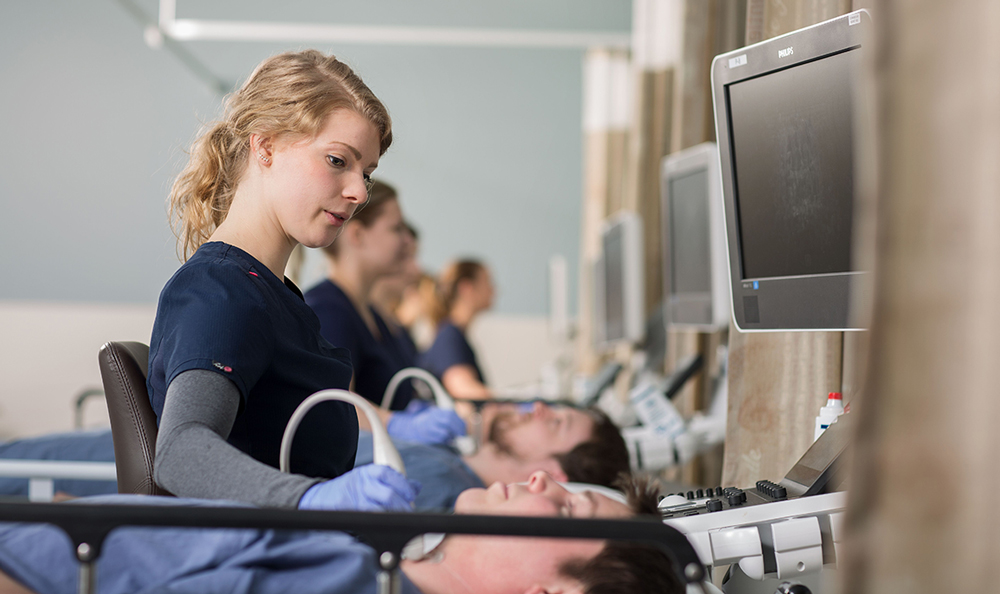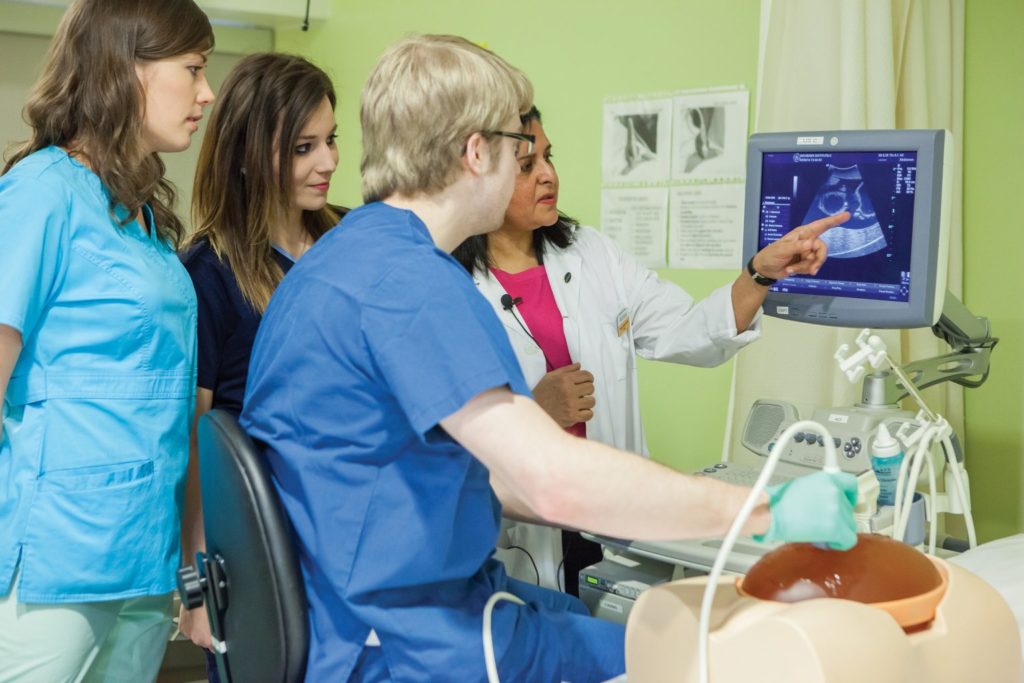Ultrasound Technician Online Courses
Diagnostic medical sonographers are the people who use ultrasound technology in order to examine different parts of the human body, which is why it is crucial to receive proper education in this sphere.
Thus, those who want to study in a diagnostic medical sonography program will need to be ready for a lot of practice and medical knowledge. Read this article further to find out about the topics you are going to study during your studies in the program, as well as about the personal characteristics needed to become a future diagnostic medical sonographer.
Diagnostic Medical Sonography Studies
Depending on your previous levels of knowledge in the medical or ultrasound sphere, your medical imaging course might last from 1 to 3-4 years. And as you will be involved in the process of treatment and diagnosis of people's problems through diagnostic medical sonography, you will need to study some basics first.
Here is a list of courses that you will be observing in your demanding program outline:
- Anatomy;
- Physiology;
- Physics;
- Ultrasound scanning skills of Superficial Structures;
- Obstetrics and gynecology;
- Echocardiography;
- Abdomen and superficial structures;
- Cardiovascular sonography;
- Infections;
- Clinical placements and practices.
As you can see, the list of health sciences that should be obtained by a medical professional in order to use high-frequency sound waves in practice is quite big, which is why you should be highly motivated in order to enter such a program and finish it successfully.
What is more, you will need to learn a lot within quite a short period of time, and each program has its own requirements for successful completion. However, clinical placement hours are necessary for becoming great health care providers that use medical imaging technology in their practice.
Who Would be a Perfect Sonographer?
Constant work with patients and a need for updating your knowledge and skills with the help of medical research and online learning programs is definitely not for everybody, which is why you need to think very carefully before choosing to enroll in ultrasound programs, as student success depends deeply on his or her personal traits and preferences.
Here is a list of crucial personal characteristics that you should have for successfully completing prerequisite courses of your educational program and becoming a professional in the sphere of ultrasound patient care:
- Be a task solver that needs to get to the bottom of the problem;
- Have an interest in working with patients in a healthcare team environment on a daily basis;
- Have solid hand-eye coordination and a preference for technical skills and critical thinking skills;
- Be ready for a lot of theoretical and clinical training;
- Have excellent computer literacy skills.
Admission Requirements
Every diagnostic medical sonography program will have its own requirements depending on the level of education it provides and the prior knowledge already received by you.
Thus, diagnostic medical sonography programs that prepare ultrasound technicians from the start will usually have the following list of academic admission requirements for its incoming students:
- Math Exams;
- English Language Arts;
- Biology Exams;
- Physics Exams.
Such courses could be a part of your high school education or of your university one. And as for international students will also need to pass certification exams related to the English language knowledge of international students. Particular programs might also include some non-academic related admission requirements.
As for healthcare professionals that want to update their patient care skills and already have some clinical skills received in previous years, it is usually the case that you will need to provide the educational establishment with proof of your prior clinical education and maybe pass some additional exams.
There are also some additional documents that are mandatory for every applicant and should be given to the educational establishment in which the course completion will be held:
- Passing of School of Health and Public Safety Entrance Testing Process for program entry;
- Current Heart and Stroke Foundation Health Care Provider Level;
- Health and wellness status;
- Updated immunization records;
- Police Information Check, including Vulnerable Sector Check.
Life After Sonography Program Graduation
After successful completion and graduation from your diploma program, you will be ready to work in a variety of different places as an ultrasound technician. What is more, you might strengthen your portfolio by taking Sonography Canada Generalist examinations and American Registry of Diagnostic Medical Sonography specialty examinations in Abdomen and Obstetrics & Gynecology exams.
Graduates have the following employment options after their ultrasound courses:
- Public clinical practice;
- Private clinics;
- Medical research and development centers;
- Commercial sales.
Your received education can now help you not only to get a job in some clinical sites but to participate in research as well as help companies make medical sales. This way, you can either choose one of the options or combine them together.
Offline versus Online Programs
Covid-19 brought us an opportunity to study in an online format; however, it also brought us a new dilemma: what kind of format for receiving academic knowledge is the best one to prepare students for future sonography careers?
In our practice, it all depends on your own possibilities and prior level of knowledge in a particular sphere. Thus, those of you who already received some medical profession and/or have to work while studying will prefer online program delivery to the offline one, as it will simply save you a lot of time on travelling to your university or college and allow you to watch some lectures when you have free time after work.
However, for those of you who are only starting your medical journey, it would be better to consider offline courses, as it is a format that allows you more communication both with your teachers and colleagues, which means better assimilation of information. What is more, not every online course has an opportunity to provide you with lab courses or practical sessions on a clinical site.
And, of course, every format has its own pros and cons. Thus, online programs are not the best tools for working on team projects or for asking for more clarification on an issue from the side of your teachers, which means that you would not have a lot of possibilities to connect with people and help each other out.
As for offline programs, they might be very time and energy-consuming, as you will need to spend additional time travelling to the university. You will also need to participate in lectures not when it is comfortable for you but during a particular time period that might not work for all of the students.
All of the students would benefit more from a hybrid format of a general sonography program, i.e. the ones that allow you to learn at home but still provide you with clinical rotations in hospitals, where you can look at and participate in ultrasound procedures.









